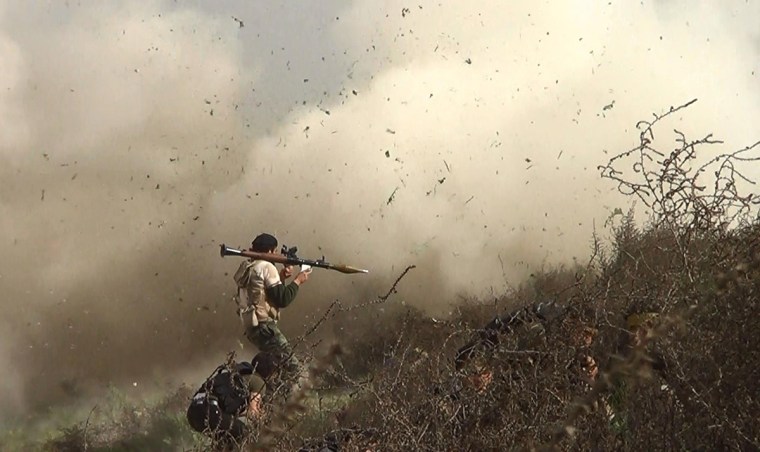President Barack Obama has said he only wants to undertake "limited" strikes against the regime of Bashar al-Assad in Syria. But the administration's draft proposal for a congressional resolution authorizing the use of military force would grant Obama the authority to do way more than that.
“The draft resolution is very broad," Democratic Maryland Rep. Elijah Cummings to reporters following a classified briefing on Syria. "The president said this effort would be limited in scope and duration and I don’t know that the authorization is that limited.”
Cummings isn't the only lawmaker concerned about how far the administration's proposal goes. NBC News reports that Judiciary Committee chair Senator Patrick Leahy of Vermont told reporters that the draft was too open ended, saying "I know it will be amended in the Senate."
"I'm concerned at this point it's too open ended," Leahy said.
A White House official said after Leahy's pronouncement that officials expected such an amendment and figured it was part of the process, NBC News reported.
Until the chemical weapons attack that the administration estimates killed almost 1,500 people near the Syrian capital of Damascus last week, Obama had appeared reluctant to apply direct US military force against the Assad regime. Saturday, the president announced he would ask Congress to approve any action he might take. Though Obama said he has the authority to strike without Congress, he emphasized that "the country will be stronger if we take this course, and our actions will be even more effective." The range of military options available to him could also be far more broad than if he had acted alone.
If Obama acted without Congress, he would be constrained by what his own administration has said he can do on his own authority. Obama could attack the Assad regime with bombs and drones, but he would not be able to deploy American forces in a manner that could involve potential US casualties, "sustained fighting or active exchanges of fire with hostile forces." The proposal the Obama administration has put forth however, authorizes Obama to "use the Armed Forces of the United States as he determines to be necessary and appropriate" in order to "prevent or deter the use or proliferation" of chemical weapons in Syria. That means everything would be on the table.
"It authorizes the President to use any element of the U.S. Armed Forces and any method of force," writes Jack Goldsmith, a former Bush Justice Department official who now teaches at Harvard law. "It does not contain specific limits on targets—either in terms of the identity of the targets (e.g. the Syrian government, Syrian rebels, Hezbollah, Iran) or the geography of the targets."
In other words, though the administration has publicly said it is seeking Congress' approval for a limited strike on Syria, it's proposal would grant Obama authority for a much more open-ended mission—one that ultimately could include boots on the ground, if Obama decided it were necessary. As written, the draft language would also approve more than just an attack on Assad, but on any of Syria's regional allies, or even the Syrian rebels if Obama decided it were necessary.
"As the history of the 9/11 AUMF shows, and as prior AUMFs show (think about the Gulf of Tonkin), a President will interpret an AUMF for all it is worth, and then some," writes Goldsmith.
Since the 9/11 terrorist attacks, Congress has passed laws that have ultimately been far more broadly interpreted than imagined at the time. Both the Bush and Obama administrations have interpreted Patriot Act provisions to allow the bulk collection of Americans' communication data—something at least one key author of the law says was never intended. The original authorization to use military force against the perpetrators of the 9/11 attacks, which amounts to a few hundred words, has been used to justify everything from indefinite detention of terror suspects to targeted strikes against terrorist groups that didn't even exist when the Twin Towers were brought down by Al Qaeda.
Congress, Goldsmith says, could write an authorization that would limit Obama's options in a number of ways, placing restrictions on available resources, possible targets, methods of military force, or even a time limit on the authorization itself. There are plenty of historical examples, including ill-fated US missions in Lebanon and Somalia.
The scope of any authorization to use force in Syria will likely provoke fierce debate in Congress. Already, Republican Senators John McCain of Arizona and Lindsey Graham of South Carolina have threatened not to support any resolution that isn't aimed at defeating Assad, a goal the administration has expressly rejected. Senator Rand Paul of Kentucky, who opposes the use of military force in Syria said the chances were even that the House would vote down Obama's request.
"I think the Senate will rubber stamp what [Obama] wants but I think the House will be a much closer vote," Paul told NBC News' David Gregory Sunday. "And there are a lot of questions we have to ask."
